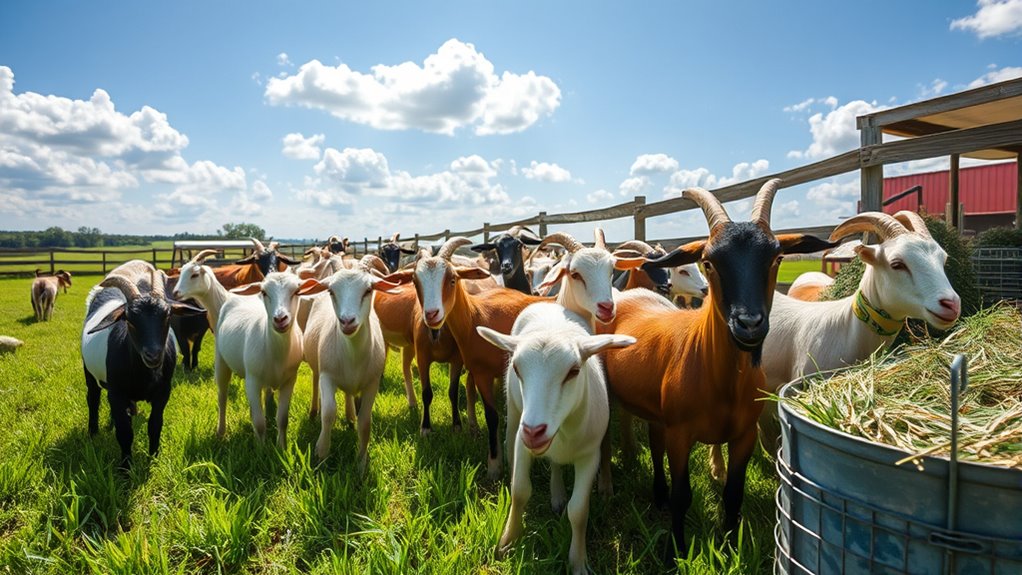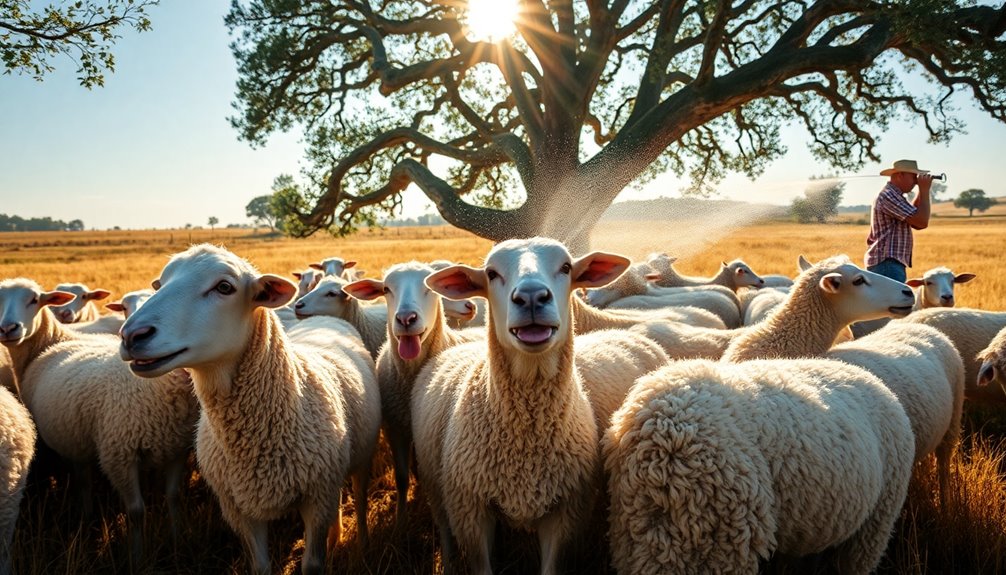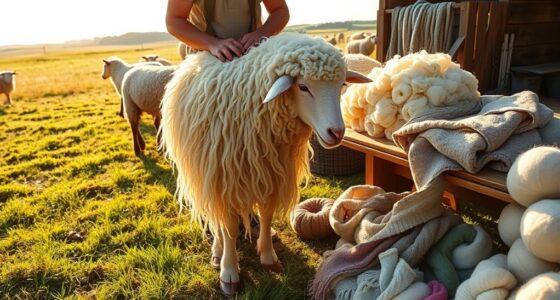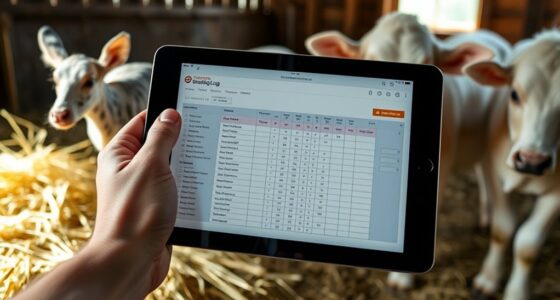To care for goats, it’s essential to understand different breeds, provide balanced nutrition, and keep them secure with proper fencing. Choose durable fencing like woven wire or electric options to prevent escapes, and regularly inspect for damage. Offer fresh water, nutritious feed, and a clean shelter to promote health and productivity. By focusing on their environment and needs, you’ll keep your goats happy and safe—there’s more to explore on each aspect as you continue.
Key Takeaways
- Choose goat breeds suited to your climate and purpose, such as meat, dairy, or fiber production.
- Provide a balanced diet with high-quality forage, grains, and fresh water to promote health and productivity.
- Use durable, secure fencing like woven wire or electric fences at least four feet high to prevent escapes.
- Regularly inspect and repair fencing, gates, and fencing features to ensure goat safety and containment.
- Maintain a clean, predator-proof environment with proper shelter to support goat well-being and prevent health issues.
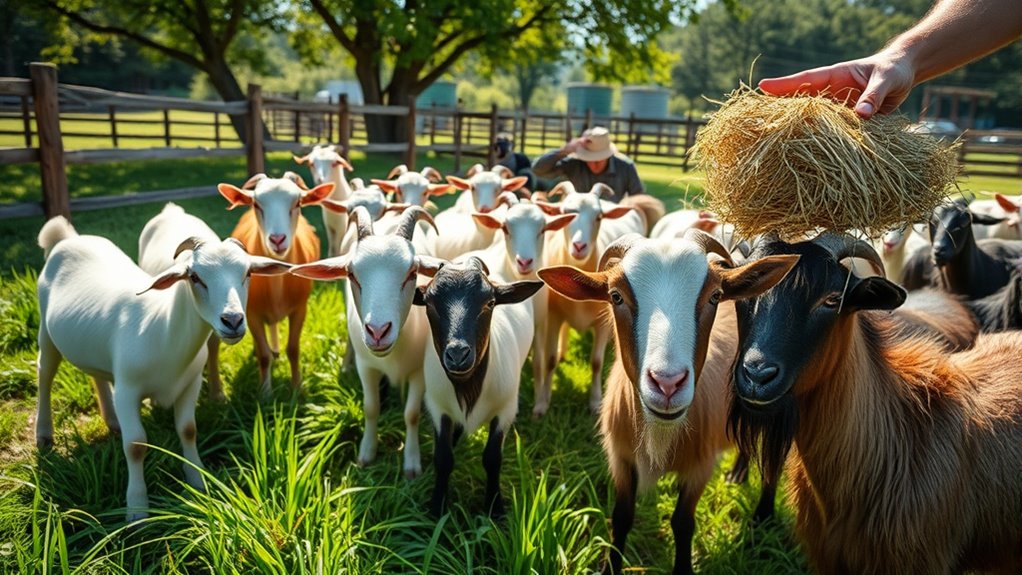
Goats are versatile and hardy animals that have been domesticated for thousands of years, providing milk, meat, fiber, and even companionship. As a goat owner, your primary concern is guaranteeing their well-being, which starts with maintaining good goat health. You need to pay close attention to their diet, monitor for signs of illness, and keep their environment clean. Regular health checks are essential, including checking for parasites, hoof trimming, and vaccinations. By staying proactive, you can prevent many common health issues that affect goats, such as weight loss, respiratory problems, or infections. Proper nutrition, fresh water, and adequate shelter all contribute to their overall health, making sure they’re active and productive.
Equally important is creating a secure environment that protects your goats from predators and prevents escapes. This is where fencing techniques come into play. When setting up fencing, you want to choose durable materials that withstand your goats’ behavior and the local weather. Electric fencing is a popular choice because it effectively deters goats from pushing through or climbing over. It’s easy to install and maintain, and it provides a safe boundary that keeps predators out while allowing good airflow. If you prefer traditional fencing, woven wire or high-tensile wire fences work well, especially if you guarantee they are tall enough—at least four feet—to prevent escape attempts. You should also bury the fencing at the base or add a smooth top rail to discourage goats from jumping over.
Regular inspection of your fencing is vital. Look for any weak spots, loose wires, or areas where goats might try to squeeze through or climb. Repair damaged sections promptly to maintain a secure perimeter. Remember, goats are curious and clever animals; they can find ways to escape if fencing isn’t robust enough. Incorporate gates that are secure and easy to open for you but difficult for goats to push open. Using proper fencing techniques not only keeps your goats safe but also reduces stress and injury risks, contributing to their overall health. Additionally, considering self-watering planters for maintaining healthy plants around their enclosure can help ensure a clean and green environment.
Frequently Asked Questions
How Do I Introduce New Goats to the Herd Safely?
To introduce new goats safely, start with goat socialization by keeping them separate but near each other, allowing scent exchange. Gradually mix the new goats with the herd during supervised sessions to promote positive interactions. Use herd integration strategies like providing plenty of space and hiding spots. Observe their behavior closely and intervene if any aggression occurs. This approach helps build trust and guarantees a smooth, stress-free integration process.
What Are Signs of Common Goat Health Issues?
You’ll notice signs of common goat health issues like a cough, nasal discharge, or labored breathing, which indicate respiratory illness. Watch for signs of goat parasite management issues, such as a rough coat, weight loss, or diarrhea. If you see these symptoms, consult your vet promptly to prevent complications. Regular health checks and proper parasite control are essential to keep your goats healthy and thriving.
How Can I Prevent Goats From Escaping the Fencing?
To prevent goats from escaping, make sure your goat enclosure has sturdy, high-quality fencing that’s appropriate for goats’ agility. Regularly inspect and repair fencing to fix any weak spots or damage. Use secure gates with latches that goats can’t open, and consider adding electric fencing if necessary. Consistently maintaining and reinforcing your fencing keeps goats safely contained, reducing the chance they’ll escape and get into trouble.
What Is the Average Lifespan of a Goat?
You can expect a goat’s average lifespan to be around 10 to 15 years, depending on their goat nutrition and overall care. Proper nutrition supports healthy growth and longevity, while understanding their breeding cycles helps prevent health issues that could shorten their lives. Regular veterinary check-ups, a balanced diet, and safe fencing also play crucial roles in ensuring your goats live their full lifespan comfortably and happily.
How Do I Handle Aggressive or Dominant Goats?
To handle aggressive or dominant goats, observe their behavior closely and identify triggers. You can gently assert yourself with calm, consistent handling to establish boundaries. Guarantee herd dynamics are balanced by providing enough space and resources, reducing competition. Use positive reinforcement to encourage calm behavior, and avoid punishing them, which can escalate aggression. Over time, these strategies help manage their behavior and maintain harmony within your herd.
Conclusion
Now that you know the basics of goat breeds, feeding, and fencing, you’re ready to start your own herd. Did you know goats can consume up to 4 pounds of food daily per 100 pounds of body weight? With proper care and a secure environment, you’ll enjoy their playful personalities and fresh milk. Get started today, and watch your goats thrive—it’s easier than you think!

